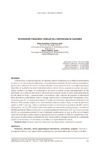Please use this identifier to cite or link to this item:
https://accedacris.ulpgc.es/jspui/handle/10553/105955
| DC Field | Value | Language |
|---|---|---|
| dc.contributor.author | Balea Fernandez, Francisco Javier | en_US |
| dc.contributor.author | Alonso Ramírez, Javier | en_US |
| dc.date.accessioned | 2021-03-19T15:19:52Z | - |
| dc.date.available | 2021-03-19T15:19:52Z | - |
| dc.date.issued | 2020 | en_US |
| dc.identifier.issn | 0214-9877 | en_US |
| dc.identifier.uri | https://accedacris.ulpgc.es/handle/10553/105955 | - |
| dc.description.abstract | La demencia es un síndrome adquirido, de naturaleza orgánica caracterizado por un deterioro permanente dela memoria y de otras funciones intelectuales, y frecuentemente acompañado de otros trastornos psiquiátricos,que ocurren sin alteración del nivel de conciencia, afectando al funcionamiento social. Las pruebas diagnósticasdisponibles en la actualidad se basan fundamentalmente en criterios clínicos, apoyadas por pruebas neuropsico-lógicas, analíticas y de imagen. En la actualidad no se conoce el complejo proceso neurodegenerativo de estaenfermedad, pero si tenemos datos sobre la intervención de los síntomas de esta. El diseño experimental utilizadoen este trabajo es de tipo “cuasiexperimental” con evaluación antes y después del programa de estimulación(taller de memoria y automatismos; lectura y lenguaje; ejercicio físico y psicomotricidad; musicoterapia y reco-nocimiento corporal). La muestra está formada por 21 sujetos de ambos sexos, diagnosticados de Demencia TipoAlzheimer (DTA) probable, tratados en los centros de día y residencia durante 6 meses. La media de edad de lossujetos es de 80,71 años (Sx= 4,85). Los resultados muestran una disminución en puntuación del MEC (máximo35 puntos) de -1,67 (Sx3.88; p<0.05); cuando el/la cuidadora principal acude a apoyo psicológico, la puntuacióndel MEC aumenta de media en 0.8 (Sx2.9), si no acude la puntuación disminuye en 3.91 (Sx3.3) con un p valorde 0.03. Las conclusiones extraídas son que el tratamiento de estimulación es igual de eficaz para el manteni-miento del rendimiento cognitivo general y capacidad funcional en pacientes con deterioro cognitivo leve, mode-rado y grave; Cuando el trabajo se extiende al binomio familia-enfermo, mediante la aplicación de un tratamientoparalelo no farmacológico a los familiares los resultados son significativamente mejore. | en_US |
| dc.description.abstract | Dementia isan acquired syndrome, of an organic nature characterized by a permanent deterioration of memory and otintellectual functions, and frequently accompanied by other psychiatric disorders, which occur without alteringthe level of consciousness, affecting social functioning. Currently available diagnostic tests are primarily basedon clinical criteria, supported by neuropsychological, analytical, and imaging tests. Currently, the complex neu-rodegenerative process of this disease is not known, but we do have data on the intervention of its symptoms.The experimental design used in this work is of a “quasi-experimental” type with evaluation before and after thestimulation program (memory and automatism workshop; reading and language; physical exercise and psycho-motricity; music therapy and body recognition). The sample is made up of 21 subjects of both sexes, diagnosedwith probable Alzheimer Disease, treated in the day and residence centers for 6 months. The mean age of thesubjects is 80.71 years (SD = 4.85). The results show a decrease in MEC score (maximum 35 points) of -1.67(SD 3.88; p <0.05); when the main caregiver goes to psychological support, the MEC score increases on avera-ge by 0.8 (SD 2.9), if he does not go, the score decreases by -3.91 (SD 3.3) with a p value of 0.03. The conclusions drawn are that the stimulation treatment is just as effective in maintaining general cognitive performanceand functional capacity in patients with mild, moderate and severe cognitive impairment; When the workextends to the family-patient binomial, by applying a parallel non-pharmacological treatment to the relatives,the results are significantly better. | en_US |
| dc.language | spa | en_US |
| dc.relation.ispartof | INFAD | en_US |
| dc.source | Revista INFAD de psicología. International Journal of Developmental and Educational Psychology [ISSN 0214-9877], v. 1, p. 225-233 (Junio 2020) | en_US |
| dc.subject | 32 Ciencias médicas | en_US |
| dc.subject | 61 Psicología | en_US |
| dc.subject.other | Alzheimer | en_US |
| dc.subject.other | Demencia | en_US |
| dc.subject.other | Intervención psicológica familiar | en_US |
| dc.subject.other | Estimulación | en_US |
| dc.subject.other | Programa | en_US |
| dc.title | Intervención psicológica familiar en la enfermedad de alzheimer | en_US |
| dc.type | info:eu-repo/semantics/article | en_US |
| dc.identifier.doi | 10.17060/ijodaep.2020.n1.v1.1779 | en_US |
| dc.description.lastpage | 233 | en_US |
| dc.identifier.issue | 1 | - |
| dc.description.firstpage | 225 | en_US |
| dc.relation.volume | 1 | en_US |
| dc.investigacion | Ciencias de la Salud | en_US |
| dc.type2 | Artículo | en_US |
| dc.description.numberofpages | 9 | en_US |
| dc.utils.revision | Sí | en_US |
| dc.date.coverdate | Junio 2020 | en_US |
| dc.identifier.ulpgc | Sí | en_US |
| dc.contributor.buulpgc | BU-MED | en_US |
| dc.description.dialnetimpact | 0,0 | |
| dc.description.dialnetq | Q3 | |
| dc.description.dialnetd | D7 | |
| dc.description.erihplus | ERIH PLUS | |
| item.grantfulltext | open | - |
| item.fulltext | Con texto completo | - |
| crisitem.author.dept | GIR IUMA: Diseño de Sistemas Electrónicos Integrados para el procesamiento de datos | - |
| crisitem.author.dept | IU de Microelectrónica Aplicada | - |
| crisitem.author.dept | Departamento de Psicología, Sociología y Trabajo Social | - |
| crisitem.author.orcid | 0000-0003-2028-0858 | - |
| crisitem.author.parentorg | IU de Microelectrónica Aplicada | - |
| crisitem.author.fullName | Balea Fernandez, Francisco Javier | - |
| crisitem.author.fullName | Alonso Ramírez, Javier | - |
| Appears in Collections: | Artículos | |
Page view(s) 5
466
checked on Jan 15, 2026
Download(s)
236
checked on Jan 15, 2026
Google ScholarTM
Check
Altmetric
Share
Export metadata
Items in accedaCRIS are protected by copyright, with all rights reserved, unless otherwise indicated.
